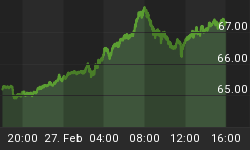Below is an extract from a commentary posted at www.speculative-investor.com on13th January 2005.
Gold is not a hedge against inflation (inflation, here, being defined as an increase in the supply of money and credit). For example, there was rampant inflation in the US during 1997-2000 and yet gold fared poorly. On the other hand, there was rampant inflation during 2001-2004 and gold did well. The big question, therefore, is: why did gold supposedly benefit from the inflation of 2001-2004 and not from the inflation of 1997-2000?
The short answer is that the US$ was strong during 1997-2000 and weak during 2001-2004, but this answer just begets another question: why was the US$ strong during the first period and weak during the second?
The reason is that confidence in the dollar was rising during 1997-2000 and falling during 2001-2004. And this trend reversal in confidence occurred because it started to become clear, during the second half of 2000, that the US economic boom was the result of credit expansion and speculation rather than a "technology-driven productivity miracle". The US therefore went from being widely perceived as a country that offered superior REAL returns on investment to one that offered relatively poor real returns on investment. After that, the effects of inflation began to appear more in the prices of gold and commodities and less in the senior US stock indices.
The bottom line is that regardless of what is happening on the inflation front, the investment demand for gold increases when confidence in fiat currency -- in this case, the US$ -- is falling. Inflation is often a cause of such a loss of confidence, but situations sometimes arise where higher inflation does not lead to a fall in confidence and a consequential rise in the gold price. Furthermore, situations can arise where confidence in a currency plummets, causing the gold price to shoot upward in terms of that currency, for reasons other than runaway inflation. The collapse of the Argentine Peso following the removal of its US$ peg is a good example.
This leads us to our main point, which is that although confidence in the US$ has taken a hit over the past three years the level of confidence in fiat currency in general has not fallen to any meaningful extent. We say this because the gold price in terms of major currencies other than the US$ has moved sideways over the past three years. To be more accurate, what we've seen over the past six years has been a three-year period (1999-2001) during which gold was modestly weak against the US$ and strong against other major fiat currencies such as the euro, followed by a three-year period during which gold was strong against the US$ while barely holding its own against most of the other major currencies. These two periods are identified on the below chart of the euro gold price.

Gold's performance over the past 6 years tells us that the fiat currency system is not yet in trouble; that all we've seen, up until now, is a shift in investor preferences WITHIN the system. What has happened could be likened to participants in the US stock market favouring tech stocks during one period and financial stocks during the next, with the S&P500 Index remaining stable throughout.
As long as the euro continues to be seen as a good alternative during those times when confidence in the US$ is falling and as long as the US$ continues to be seen as a good option during those times when the euro looks unattractive, the sort of huge gains in the gold price that gold bulls like ourselves expect to see at some point over the next few years will not materialise. What will really be needed in order for such gains to occur will be a general loss of confidence in fiat currency. And by the way, such a loss of confidence is not something we hope will happen, it's something we think will be unavoidable if current monetary and fiscal policies are continued (which they almost certainly will be).
A clear signal that the aforementioned loss of confidence was in progress would be the US$ gold price trading above 460 at the same time as the euro gold price was trading above 350 (the 2002 peak); in other words, gold trading above the bull market highs achieved to date in terms of both the US$ and the euro.
If our forecast for a 6-12 month rally in the US$ proves to be correct then the sequence is likely to be a break above 350 by the euro gold price during 2005 following by a break above 460 by the US$ gold price in 2006. That is, what we expect to see this year is an upside breakout by the euro gold price from the multi-year consolidation pattern shown on the above chart. Conversely, if it turns out that we are right about the US$ rally but gold simply continues to tread water against the euro (if gold goes down against the US$ by about the same amount as the euro) then we are probably still a considerable distance (years) from large confidence-related gains in the gold market.















